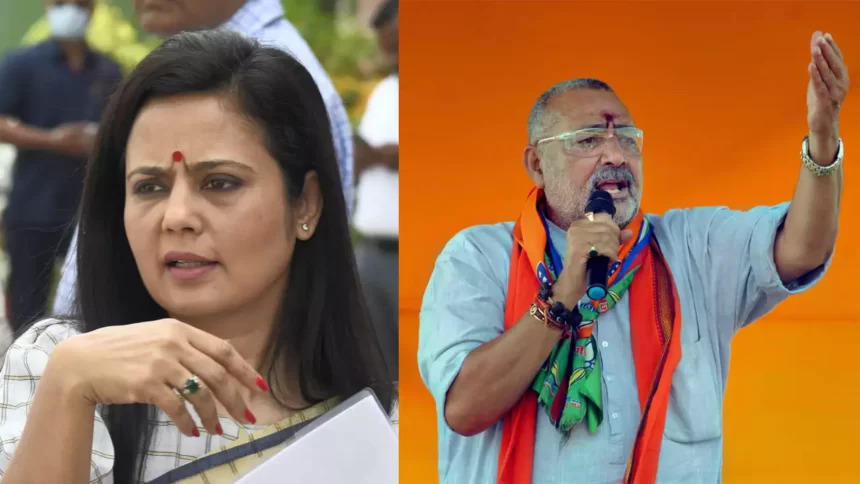The recent exchange between Trinamool Congress MP Mahua Moitra and Union minister Giriraj Singh has ignited a heated debate, shedding light on the intersection of gender politics and allegations of financial mismanagement.
The verbal duel began when Giriraj Singh made a ‘thumka’ remark against West Bengal Chief Minister Mamata Banerjee, drawing sharp criticism from Moitra. She not only accused Singh of using derogatory language but also went a step further, alleging financial impropriety within his ministry. Moitra claimed that Singh’s ministry had pilfered a staggering Rs 7000 crore meant for MGNREGA wages, directly impacting the livelihoods of the poor.
Accusing Singh of being a liar, Mahua Moitra took the issue on record, highlighting the use of the term ‘thumke lagana.’ The choice of words, according to Moitra, not only demonstrated a lack of decorum but also reflected a broader issue of misogyny within the Bharatiya Janata Party (BJP). She argued that such comments contribute to the growing disenchantment of the people of West Bengal towards the party, citing a perceived disdain for women in positions of power.
Moitra’s scathing critique did not stop there. She broadened her attack to encompass the BJP as a whole, alleging a pattern of deception that has eroded the party’s credibility in West Bengal. The assertion that the people of the state harbor a collective aversion to the BJP due to its perceived misogyny and disdain for women in leadership positions is a serious indictment, raising questions about the party’s strategies in the region.
More About It:
Expressing her hope for an apology from Giriraj Singh, Moitra nonetheless voiced skepticism about the likelihood of such a gesture. The standoff encapsulates the deep-rooted ideological differences and political animosity that have come to define the landscape of Indian politics, particularly in the context of regional power struggles.
As this verbal clash plays out on the public stage, it underscores the importance of maintaining civility in political discourse. The allegations of financial malfeasance coupled with the gendered nature of the comments expose the fault lines within the political narrative, prompting a closer examination of the language and behavior exhibited by elected representatives.
In the days to come, it remains to be seen whether Giriraj Singh will respond to Moitra’s demands for an apology and clarification on the alleged financial irregularities. The incident also prompts reflection on the broader implications for political discourse and decorum, as leaders grapple not only with ideological differences but also with the responsibility of setting a standard for respectful engagement in the public sphere.
